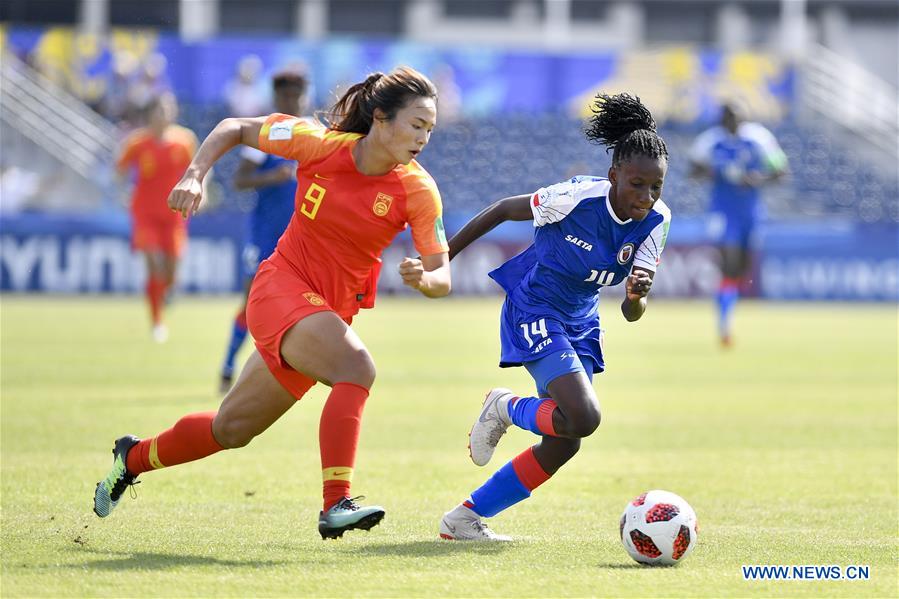Dawn of a new goal-den era
 0 Comment(s)
0 Comment(s) Print
Print E-mail China Daily, March 21, 2019
E-mail China Daily, March 21, 2019

Women's soccer has fought a long battle for recognition - but after several false starts the game has swelled in popularity and this year's World Cup finals in France promises to be the most-watched in history.
The women's game first emerged in Britain after World War I and found a new wave of support in the late 1960s before receding - only to re-emerge in the 1990s.
The emancipation movement after World War I triggered what many historians consider to be the golden age of women's soccer.
As men were drafted to the front, women took their place on the factory floor. During their breaks, some enjoyed kick-arounds in the yards, a tradition the male factory workers had previously enjoyed.
The era's great team was formed at the Dick, Kerr & Co.'s munitions factory in Preston, northwest England, and their star player, Lily Parr, remains the sole woman in English soccer's Hall of Fame. She was inaugurated in 2009.
On Dec 26, 1920, over 53,000 fans filled Everton's Goodison Park in Liverpool to watch Dick, Kerr Ladies beat St. Helen's 4-0.
However, the following year, the Football Association banned women from playing on Football League grounds, saying "the game of football is quite unsuitable for females and ought not to be encouraged".
Feminist movement
Women's soccer then began to gain ground in Belgium, France and Germany. But without national infrastructures, it faded in the 1930s.
By the 1960s, the burgeoning feminist movement gave the game fresh impetus.
"The movement liberated women not only politically but physically," said historian Anais Bohuon of Paris Sud university.
"We could do what the men did and if we wanted to pursue physical pastimes, we could."
The women's game once again raised its head when the first European championships took place in 1969. Italy emerged the winner, although neither UEFA nor FIFA recognized the event as official.
A seven-nation World Cup was organized in Italy in 1970, won by Denmark, and several other events took place without FIFA's sanction.
'Moral fears'
Progress was slow for the women's game, while feminism in the wider sense continued to advance only incrementally in terms of gaining equal civil rights.
Women playing soccer "was a concrete example of all the moral fears that have crossed the centuries surrounding women and their bodies and what they do with them," Bohuon said.
"There were great fears, both medical and social, that by making their bodies more 'masculine' they could even put their reproductive organs in danger and that they were refusing to submit to the role that had been allotted to them."
The big exception was in the United States, where from the outset "soccer was seen as a women's game, with girls playing from a very young age, and it became accepted behavior," Bohuon added.
It was no surprise then that it was American teams that dominated the first FIFA-backed World Cups, winning in 1991 and 1999, when 90,185 spectators watched the final at the Rose Bowl in California, which remains a world record for a women's match.
UEFA organized its first official women's European championships in 1984, won by Sweden, while the Asian federation had done the same as early as 1975.
Africa and South America created their regional competitions in 1991.
In terms of club soccer, a women's Champions League kicked off in Europe in 2001, while the professional era got off to a rocky start in the US before relaunching in 2009.
The 2002 British movie Bend It Like Beckham, starring Parminder Nagra and Keira Knightley, has also been credited with triggering a spike in participation.
The film tells the story of an 18-year-old soccer-mad Londoner of Sikh descent who joins her local team despite being forbidden to play.
A new attendance record for a European women's club match was set last Sunday when 60,739 spectators watched Barcelona beat Atletico Madrid 2-0 at Wanda Metropolitano Stadium in the Spanish capital.
The Ballon d'Or also has its female version, although the first ceremony was last year overshadowed by a presenter making sexist comments to the Norwegian winner, Ada Hegerberg.
The Lyon striker will be absent from the World Cup because the 23-year-old is boycotting her national federation, accusing it of an amateur approach.
Elaborating on her stance at December's Ballon d'Or ceremony, Hegerberg commented: "A lot of things need to be done to make the conditions better for women who play football."






Go to Forum >>0 Comment(s)